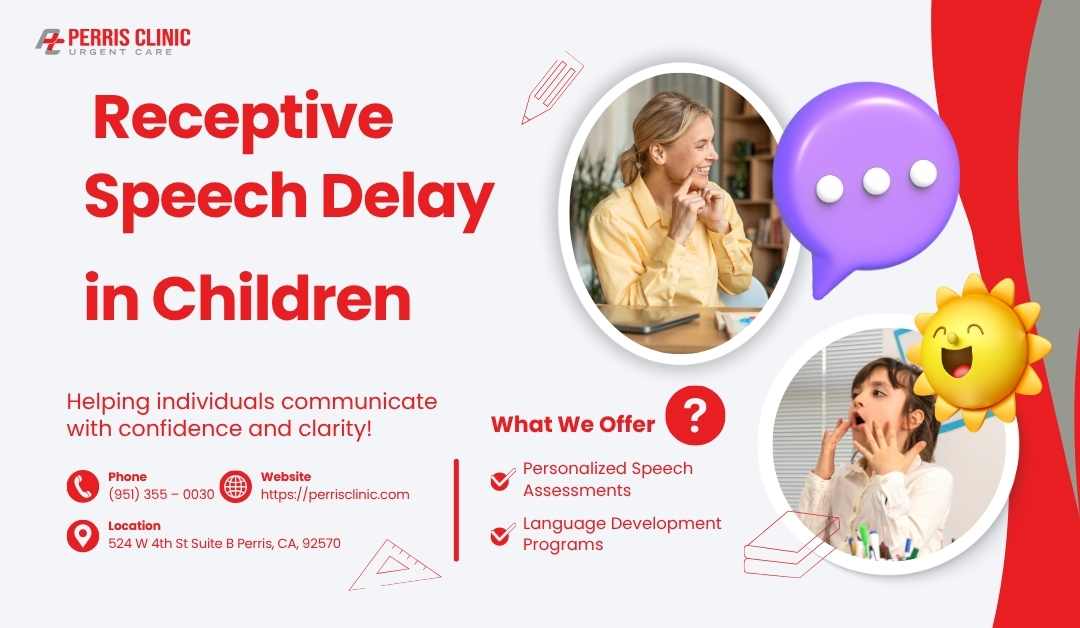Receptive speech delay occurs when a child struggles to understand words or sentences that their peers can follow with ease. This language delay shows up when a child does not respond to their name or follow simple instructions. Some children seem to “tune out” conversations or react slowly when someone talks to them.
Spotting these signs early is very important. Language skills affect learning, social growth, and daily life. Parents can help by noticing the signs and asking for an assessment. A speech-language pathologist can guide treatment and help the child make steady progress.
What Is Receptive Speech Delay?
Receptive speech delay occurs when a child struggles to understand spoken words and sentences. They may miss what others say, even when it is simple. This delay is different from trouble speaking, which is called expressive language delay.
What Does Receptive Language Delay Mean?
Receptive language delay means a child struggles to take in and understand language. For example, they might not follow simple instructions or respond when called. This can make learning new words harder and slow down their ability to react to speech around them. Expressive language delay is about having trouble using words to talk or share ideas. Receptive delay is about not understanding what is said. Some children have both, but they affect different parts of how kids communicate.
When Do Kids Usually Develop These Skills?
Most kids start to understand simple words between 12 and 18 months. By age two, they follow easy directions and understand more complex sentences. If a child doesn’t reach these steps on time, it might show they have a receptive language delay.
Common Signs of Receptive Speech Delay
Children with receptive speech delay have trouble understanding words and sentences. This delay shows up in many ways. Parents and caregivers often notice these signs early. Spotting them can help get the proper support faster. One of the first signs is when a child often misses simple instructions. For example, when asked to “come here” or “give me the toy,” the child might not respond or seem confused. This happens because they struggle to process the words or understand what is being asked.
Ignores Their Name or Familiar Sounds
Children with receptive language delay might not respond when you call their name. They may also ignore familiar sounds like a phone ringing or a dog barking. This lack of reaction can seem like they are not paying attention. But often, it means they are having trouble understanding or noticing the sounds around them.
What is Receptive Language Disorder? Receptive language disorder makes it hard for children to understand words, questions, and instructions. Read this to know the signs, causes, and how early support can help.
Struggles to Understand Age-Appropriate Words
At every age, children learn to understand certain words and phrases. A child with a receptive speech delay may struggle to understand words that other children know easily. For instance, they might not understand words like “stop,” “no,” or names of everyday objects. This struggle affects how they follow conversations and learn new things.
Shows Little Reaction to Stories, Songs, or Conversations
Many children enjoy listening to stories, songs, or chatting with others. A child with a receptive language delay may show little interest or reaction during these activities. They might not point at pictures in a book or try to join in singing. This can happen because they struggle to follow the conversation or do not grasp the underlying meaning.
Recognizing these signs helps parents and teachers know when a child needs help. Early support from a speech-language pathologist can improve how children understand and respond to language. Parents can also try simple activities at home, like repeating words and using clear instructions, to help their child’s language grow.
Causes of Receptive Speech Delay
Receptive speech delay can happen for different reasons. Understanding the causes helps parents and professionals find the proper support. Sometimes, more than one cause affects a child’s language skills.

Developmental Delays
Some children develop language skills more slowly than others. This is called a developmental delay. It means their brain takes more time to process sounds and words. These delays can be temporary or part of a broader delay in other areas, like thinking or movement. Hearing loss is a common cause of receptive language delay. When children have trouble hearing, they miss out on sounds and words. Frequent ear infections can also affect hearing. If a child can’t hear well, they will struggle to understand the speech around them.
Autism Spectrum Disorder and Neurological Conditions
Some children with autism or other neurological conditions may have trouble understanding language. They might struggle to focus on speech or understand what others say. This can slow their receptive language skills and make communication more difficult. Children learn language from their surroundings. If a child grows up in an environment with little talking or reading, they may develop receptive delays. Also, children exposed to two or more languages might take longer to understand words in each language, though this is usually not a problem by school age.
Knowing the causes helps parents and speech therapists plan the proper care. Early checkups and hearing tests are essential to catch problems quickly. Working with a speech-language pathologist can give children the tools to improve how they understand language.
When to See a Speech-Language Pathologist (SLP)
Knowing when to get help is essential for children with receptive speech delay. Early action can make a big difference in their language growth. Parents should watch for signs and talk to a professional if they have concerns. Parents should look for signs like a child not responding to their name, missing simple instructions, or showing little interest in talking or listening. If a child struggles to understand everyday words or has trouble following directions, these can be signs of receptive language delay. If you notice these signs, don’t wait. Early evaluation helps find out if your child needs speech therapy. Speech-language pathologists use special tests to check how well a child understands and uses language.
The Role of the Speech-Language Pathologist
An SLP can assess a child’s receptive and expressive language skills. They create a plan to help the child improve understanding and communication. Early therapy often leads to better results and helps children catch up with their peers. Getting help early can make a big difference. If you’re unsure, it’s always better to ask a speech-language pathologist for advice. They can guide you and your child toward better language skills.
Diagnosis and Assessment of Receptive Speech Delay
When parents or teachers notice signs of receptive speech delay, a proper diagnosis helps plan the best support. Speech-language pathologists use tests and observations to understand a child’s language skills.

How Speech-Language Pathologists Assess Receptive Language
SLPs use different tools to check how well a child understands words and sentences. They may ask the child to follow instructions, point to objects, or respond to questions. These activities show how the child processes spoken language.
There are several tests designed for toddlers and older children. These include standardized checklists or interactive tasks. The tests measure a child’s ability to understand everyday words, directions, and conversations.
Why Early Assessment Matters
The earlier a child gets assessed, the sooner they can start therapy if needed. Early diagnosis helps catch delays before they affect learning and social skills. It also gives parents clear steps to support their child at home.
Diagnosis and assessment give a clear picture of a child’s language strengths and challenges. Speech-language pathologists use this information to create a focused plan that helps children improve how they understand and use speech.
Treatment and Therapy Options
Getting the right help can improve how a child understands language. Treatment for receptive speech delay focuses on building skills step by step. Speech therapists work with children and their families to make learning easier and more fun.
Speech-language pathologists use different exercises to help children improve their understanding. These may include playing games, using pictures, or practicing following simple directions. Therapy sessions focus on listening skills and understanding words in daily life.
How Parents Can Help at Home
Parents play a key role in their child’s progress. They can practice simple activities like reading books, singing songs, and talking clearly. Using short sentences and repeating words helps children learn better. Encouraging the child to respond and join conversations supports their growth.
Regular practice helps children build and keep their language skills. The more a child hears and uses words, the easier it becomes to understand language. Therapy and home support work best when done consistently.
With early treatment and ongoing support, children can improve how they understand and use language. Speech therapy gives children the tools to take part more fully in learning and everyday conversations.
Tips for Supporting Children at Home
Parents and caregivers can help children improve their receptive language every day. Small, simple actions make a big difference. These tips support language growth and make learning fun. Reading books and singing songs expose children to new words and sounds. Talking clearly and often helps children hear how language works. Try to use short sentences and repeat essential words. This gives children more chances to understand and learn.
Use Gestures and Visual Aids
Gestures like pointing or showing pictures help children connect words with meaning. Visual aids make it easier for kids to follow instructions and understand stories. Use toys, drawings, or photos to support language learning.
Ask simple questions and wait patiently for your child to respond. Please encourage them to point, nod, or use words to join in conversations. This helps build confidence and improves their ability to understand and communicate. These easy activities create a rich language environment. When parents support children at home, therapy works better, and kids feel more confident using language every day.
Can Children Outgrow Receptive Speech Delay?
Many parents wonder if children can outgrow receptive speech delay. The answer depends on several factors, including early support and consistent therapy. With the right help, many children improve their language skills over time. Starting speech therapy early helps children learn faster. A speech-language pathologist works with the child to build understanding through fun and effective exercises. Early support often leads to better results and helps children keep up with their peers.
Parental Involvement Matters
Parents play a significant role in helping children overcome delays. Practicing language skills at home, using clear instructions, and encouraging conversation all support progress. Children learn more when families work closely with speech therapists.
Every child grows at their own pace. Some catch up quickly, while others need more time and support. Consistent therapy and a strong support system increase the chances of steady improvement in receptive language skills. With early help and ongoing support, many children do improve how they understand and use language. Patience and encouragement from parents and therapists make a big difference.
Prevention and Early Intervention
Stopping receptive speech delay before it gets worse starts with early action. Parents and caregivers can watch for signs and take steps to help children build strong language skills from the beginning. Regularly checking a child’s language milestones helps catch delays early. Doctors and speech-language pathologists use these milestones to see if a child understands and uses language as expected. Routine health checkups are a good time to discuss any concerns. Hearing plays a significant role in how children learn language. Hearing tests can find problems early. Fixing hearing issues quickly helps children catch up with language skills and reduces delays.
Encourage Talking and Reading at Home
Talking, reading, and playing with your child daily creates a rich language environment. These activities boost understanding and help children learn new words. Early involvement in language helps prevent delays. Early detection and support make a big difference in a child’s language growth. Parents and professionals working together give children the best chance to succeed.
Conclusion
Receptive speech delay can make it hard for children to understand words and instructions. Knowing the signs early helps parents get the proper support faster. Working with a speech-language pathologist and practicing language skills at home can help children improve.
Early action makes a big difference. When children get the help they need, they can catch up and grow confident in their language skills. If you notice any signs of receptive speech delay, don’t wait to ask for help. With care and support, every child can do better.
FAQs for Receptive Speech Delay
Can a receptive speech delay go away?
Yes. Many children improve with early therapy and support. Speech therapy helps build understanding, and parents’ involvement speeds progress. Early action gives the best chance for growth.
At what age is receptive speech delay diagnosed?
Signs can appear by 18 months. Formal diagnosis usually happens between the ages of 2 and 3 when language delays become clearer. Early checkups help catch issues sooner.
How does receptive speech delay differ from expressive language delay?
Receptive delay means trouble understanding words and instructions. Expressive delay means difficulty using words to speak or share thoughts. Both affect communication, but in different ways.
How long does speech therapy usually take?
The length varies by child and delay severity. Many show progress after months of consistent therapy and practice. Regular support at home improves results.

